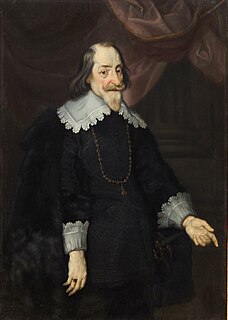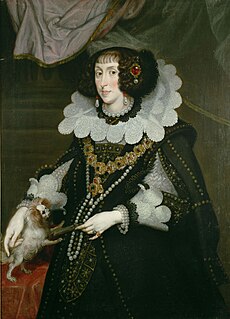
Maximilian I, occasionally called "the Great", a member of the House of Wittelsbach, ruled as Duke of Bavaria from 1597. His reign was marked by the Thirty Years' War during which he obtained the title of a Prince-elector of the Holy Roman Empire at the 1623 Diet of Regensburg.

The Bavarian State Opera is an opera company based in Munich, Germany. Its orchestra is the Bavarian State Orchestra. The company's home base is the National Theatre Munich.

Ferdinand Maria was a Wittelsbach ruler of Bavaria and an elector (Kurfürst) of the Holy Roman Empire from 1651 to 1679.

Archduchess Maria Anna of Austria, was a German regent, Electress of Bavaria by marriage to Maximilian I, Elector of Bavaria, and co-regent of the Electorate of Bavaria during the minority of her son Ferdinand Maria, Elector of Bavaria from 1651 to 1654.

Johann Caspar Kerll was a German baroque composer and organist. He is also known as Kerl, Gherl, Giovanni Gasparo Cherll and Gaspard Kerle.

The Theatine Church of St. Cajetan is a Catholic church in Munich, southern Germany. Built from 1663 to 1690, it was founded by Elector Ferdinand Maria and his wife, Henriette Adelaide of Savoy, as a gesture of thanks for the birth of the long-awaited heir to the Bavarian crown, Prince Max Emanuel, in 1662. Now administered by the Dominican Friars, it is also known as the Dominican Priory of St. Cajetan.

Giovanni Battista Ferrandini, an Italian composer of the Baroque and Classical eras, was born in Venice, Italy and died in Munich, at the age of about 81.

The Bavarian State Orchestra is the orchestra of the Bavarian State Opera in Munich, Germany. It has given its own series of concerts, the Akademiekonzerte, since 1811.

Benedetto Ferrari was an Italian composer, particularly of opera, librettist, and theorbo player.
Antonio Sartorio was an Italian composer active mainly in Venice, Italy, and in Hanover, Germany. He was a leading composer of operas in his native Venice in the 1660s and 1670s and was also known for composing in other genres of vocal music. Between 1665 and 1675 he spent most of his time in Hanover, where he held the post of Kapellmeister to Duke Johann Friedrich of Brunswick-Lüneburg – returning frequently to Venice to compose operas for the Carnival. In 1676 he became vice maestro di capella at San Marco in Venice.
Father Giambattista Varesco was a chaplain, musician, poet and librettist to Wolfgang Amadeus Mozart. His given name variously appears as Giambattista, Gianbattista, Giovanni Battista and Girolamo Giovanni Battista. He is sometimes referred to with the Italian title Abate or the French Abbé, both used for priests: he was chaplain at the Salzburg court chapel from 1766.

Henriette Adelaide of Savoy, was Electress of Bavaria by marriage to Ferdinand Maria, Elector of Bavaria. She had much political influence in her adopted country and with her husband did much to improve the welfare of the Electorate of Bavaria.
The year 1653 in music involved some significant events.
Giovanni Faustini was an Italian librettist and opera impresario of the 17th century. He is best remembered for his collaborations with the composer Francesco Cavalli.

Catone in Utica is an opera libretto by Metastasio, that was originally written for Leonardo Vinci's 1727 opera. Following Vinci's success, Metastasio's text was used by numerous composers of the baroque and classical eras for their own operas, including Pietro Torri (1736), Antonio Vivaldi (1737), Giovanni Battista Ferrandini (1753) and J. C. Bach (1761).
Pietro Torri was an Italian Baroque composer.

L'arpa festante is a German chamber orchestra, specializing in the revival and performance of unknown works, especially from the Baroque era. It was established in Munich in 1983 by Michi Gaigg, who also led the ensemble as concertmaster until 1995. The ensemble takes its name from Giovanni Battista Maccioni's dramatic cantata L'arpa festante which was first performed in 1653, inaugurating what was to become the Bavarian State Opera.
A court chapel is a chapel (building) and/or a chapel as a musical ensemble associated with a royal or noble court. Most of these are royal (court) chapels, but when the ruler of the court is not a king, the more generic "court chapel" is used, for instance for an imperial court.
Bernardo Aliprandi was an Italian composer and cellist.
Giovanni Filippo Apolloni was an Italian poet and librettist. Born in Arezzo, he has sometimes been referred to as "Giovanni Apollonio Apolloni", but the second given name is spurious. He served as the court poet to Ferdinand Charles, Archduke of Austria at Innsbruck form 1653 until 1659. On his return to Italy he entered the service of Cardinal Volumnio Bandinelli. After Bandinelli's death in 1667 Appolloni was in the service of the Chigi family in Rome and Siena for the rest of his life. He wrote the librettos for a number of operas, the most well-known of which were Antonio Cesti's L'Argia and La Dori, as well as several oratorios and the texts for cantatas by both Cesti and Alessandro Stradella.












